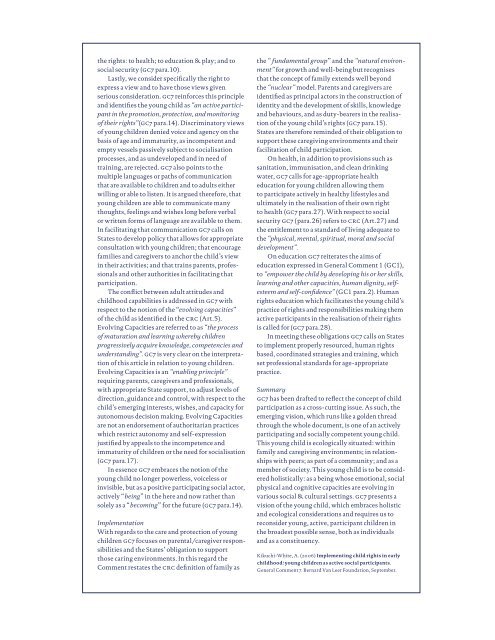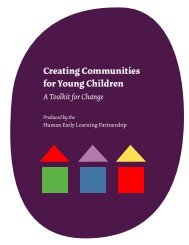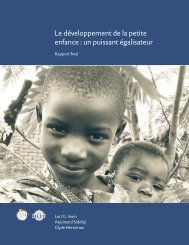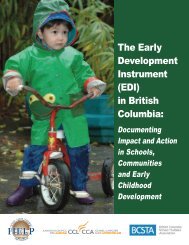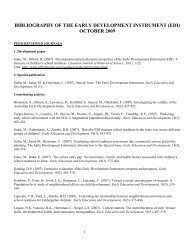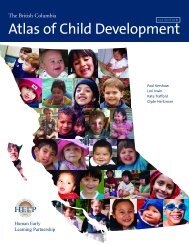Total Environment Assessment Model for Early Child Development
Total Environment Assessment Model for Early Child Development
Total Environment Assessment Model for Early Child Development
Create successful ePaper yourself
Turn your PDF publications into a flip-book with our unique Google optimized e-Paper software.
the rights: to health; to education & play; and to<br />
social security (gc7 para.10).<br />
Lastly, we consider specifically the right to<br />
express a view and to have those views given<br />
serious consideration. gc7 rein<strong>for</strong>ces this principle<br />
and identifies the young child as “an active participant<br />
in the promotion, protection, and monitoring<br />
of their rights”(gc7 para.14). Discriminatory views<br />
of young children denied voice and agency on the<br />
basis of age and immaturity, as incompetent and<br />
empty vessels passively subject to socialisation<br />
processes, and as undeveloped and in need of<br />
training, are rejected. gc7 also points to the<br />
multiple languages or paths of communication<br />
that are available to children and to adults either<br />
willing or able to listen. It is argued there<strong>for</strong>e, that<br />
young children are able to communicate many<br />
thoughts, feelings and wishes long be<strong>for</strong>e verbal<br />
or written <strong>for</strong>ms of language are available to them.<br />
In facilitating that communication gc7 calls on<br />
States to develop policy that allows <strong>for</strong> appropriate<br />
consultation with young children; that encourage<br />
families and caregivers to anchor the child’s view<br />
in their activities; and that trains parents, professionals<br />
and other authorities in facilitating that<br />
participation.<br />
The conflict between adult attitudes and<br />
childhood capabilities is addressed in gc7 with<br />
respect to the notion of the “evolving capacities”<br />
of the child as identified in the crc (Art.5).<br />
Evolving Capacities are referred to as “the process<br />
of maturation and learning whereby children<br />
progressively acquire knowledge, competencies and<br />
understanding”. gc7 is very clear on the interpretation<br />
of this article in relation to young children.<br />
Evolving Capacities is an “enabling principle”<br />
requiring parents, caregivers and professionals,<br />
with appropriate State support, to adjust levels of<br />
direction, guidance and control, with respect to the<br />
child’s emerging interests, wishes, and capacity <strong>for</strong><br />
autonomous decision making. Evolving Capacities<br />
are not an endorsement of authoritarian practices<br />
which restrict autonomy and self-expression<br />
justified by appeals to the incompetence and<br />
immaturity of children or the need <strong>for</strong> socialisation<br />
(gc7 para.17).<br />
In essence gc7 embraces the notion of the<br />
young child no longer powerless, voiceless or<br />
invisible, but as a positive participating social actor,<br />
actively “being” in the here and now rather than<br />
solely as a “becoming” <strong>for</strong> the future (gc7 para.14).<br />
Implementation<br />
With regards to the care and protection of young<br />
children gc7 focuses on parental/caregiver responsibilities<br />
and the States’ obligation to support<br />
those caring environments. In this regard the<br />
Comment restates the crc definition of family as<br />
the “ fundamental group” and the “natural environment”<br />
<strong>for</strong> growth and well-being but recognises<br />
that the concept of family extends well beyond<br />
the “nuclear” model. Parents and caregivers are<br />
identified as principal actors in the construction of<br />
identity and the development of skills, knowledge<br />
and behaviours, and as duty-bearers in the realisation<br />
of the young child’s rights (gc7 para.15).<br />
States are there<strong>for</strong>e reminded of their obligation to<br />
support these caregiving environments and their<br />
facilitation of child participation.<br />
On health, in addition to provisions such as<br />
sanitation, immunisation, and clean drinking<br />
water, gc7 calls <strong>for</strong> age-appropriate health<br />
education <strong>for</strong> young children allowing them<br />
to participate actively in healthy lifestyles and<br />
ultimately in the realisation of their own right<br />
to health (gc7 para.27). With respect to social<br />
security gc7 (para.26) refers to crc (Art.27) and<br />
the entitlement to a standard of living adequate to<br />
the “physical, mental, spiritual, moral and social<br />
development”.<br />
On education gc7 reiterates the aims of<br />
education expressed in General Comment 1 (GC1),<br />
to “empower the child by developing his or her skills,<br />
learning and other capacities, human dignity, selfesteem<br />
and self-confidence” (GC1 para.2). Human<br />
rights education which facilitates the young child’s<br />
practice of rights and responsibilities making them<br />
active participants in the realisation of their rights<br />
is called <strong>for</strong> (gc7 para.28).<br />
In meeting these obligations gc7 calls on States<br />
to implement properly resourced, human rights<br />
based, coordinated strategies and training, which<br />
set professional standards <strong>for</strong> age-appropriate<br />
practice.<br />
Summary<br />
gc7 has been drafted to reflect the concept of child<br />
participation as a cross-cutting issue. As such, the<br />
emerging vision, which runs like a golden thread<br />
through the whole document, is one of an actively<br />
participating and socially competent young child.<br />
This young child is ecologically situated: within<br />
family and caregiving environments; in relationships<br />
with peers; as part of a community; and as a<br />
member of society. This young child is to be considered<br />
holistically: as a being whose emotional, social<br />
physical and cognitive capacities are evolving in<br />
various social & cultural settings. gc7 presents a<br />
vision of the young child, which embraces holistic<br />
and ecological considerations and requires us to<br />
reconsider young, active, participant children in<br />
the broadest possible sense, both as individuals<br />
and as a constituency.<br />
Kikuchi-White, A. (2006) Implementing child rights in early<br />
childhood: young children as active social participants.<br />
General Comment 7. Bernard Van Leer Foundation, September.<br />
26


